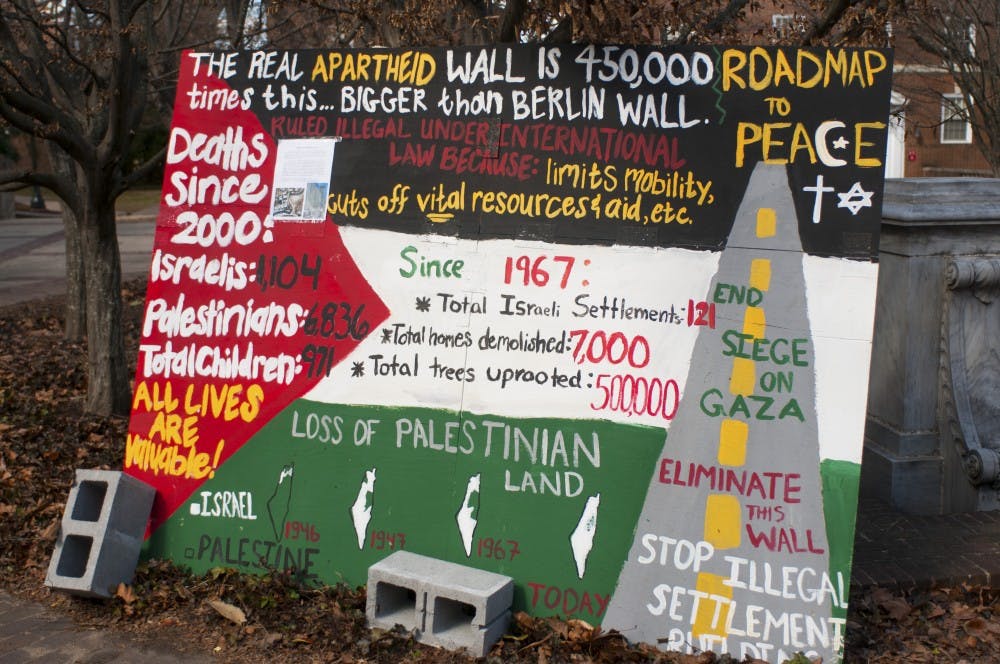Students for Peace and Justice in Palestine have displayed a mock wall by Monroe Hall since Monday to represent the separation wall found in the Israeli West Bank.
The mock barrier features statistics on the actual separation wall in Israel, maps of Palestinian and Israeli land and death tolls of both Israelis and Palestinians from throughout the Israeli-Palestinian conflict.
As a part of the 10th Annual Israeli Apartheid Week, SPJP will display the wall until March 2, in conjunction with similar events held by organizations in cities and campuses worldwide. The group hopes to educate people on the conflict and build boycott, divestment and sanctions campaigns to protest against Israeli products and companies, said SPJP president Leena Abdel-Qader, a fourth-year College student
“It’s basically just advertising what’s going on in the Palestinian territories, and also giving people an idea of what Palestinians have to endure on a daily basis,” Abdel-Qader said. “This is a way for us to [show] how the wall affects Palestinian lives.”
This event uses an analogy to apartheid to highlight the group’s overall purpose, said second-year College student and SPJP treasurer Yahiya Saad.
“Our goal is to outline the meaning of apartheid as people would know it in South Africa, and use that meaning and give examples in Palestinian territories of how apartheid applies there,” Saad said. “The wall is part of that display. We give facts, figures, and the map of how the territories are shrinking and how the settlements are increasing.”
Israeli Apartheid Weeks have experienced significant growth on campuses nationwide, said Abdel-Qader. She said she hopes to see such events grow popular at the University and within the Charlottesville community.
“Our main purpose is to educate people and to get our message across, and have people willing to listen and have an open mind,” said SPJP spokesperson Luma Abunimer, a first-year College student.
Not all groups around happy with the campaign’s message, however.
“We think that it presents the information in a biased way, without using any context, and that it is blatantly anti-Israel instead of just pro-Palestinian,” Hoos for Israel President Jeremy Conover said. “I think it misinforms students. It leads them to make conclusions that they would not otherwise make.”
Conover, a third-year College student, added that although the mock wall includes total death tolls for both Israel and Palestine, it does not make clear most Israeli deaths are civilian, the result of direct attacks by Palestine.
The use of the term “apartheid” is also concerning for groups such as Hoos for Israel and J Street, a pro-Israel and pro-peace advocacy group based in the United States.
“J Street says that Israel is not an apartheid state,” said third-year College student Billy Baker, a J Street intern. “That rhetoric is used to encourage the [boycott, divestment and sanction] movement. It inflames rhetoric, it inflames emotions and it exacerbates the problems and the differences between the two sides as opposed to encouraging them to find a solution in the middle ground.”
Conover agreed “apartheid” is a term which incites negative emotions.
“People don’t even have to know what’s actually going on in Israel; they hear apartheid and they’re automatically against it,” Conover said. “They try to use that to convince people without using any argument against Israel. It’s not useful in coming to any kind of peace agreement.”
Hoping to continue the discussion throughout the semester, SPJP will screen a movie Monday, telling the story of a Palestinian woman seeking compensation for land her grandfather lost to Israel during the conflict, Abdel-Qader said.
The Brody Jewish Center has also organized a panel to further discuss the subject.
“[We want to] talk a little bit about what the different viewpoints in the Jewish community are toward the separation wall and toward the peace process in general,” Baker said.
The panel, “Whatever It Is, It’s Not Apartheid,” will be held this Friday.







